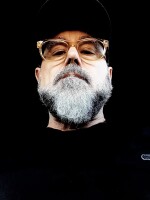This book may contain language, sexual content, and themes of grief and loss, which may be challenging for some readers. Reader caution advised.
It’s Unconventional. Don’t Be Scared Off.
by Chris Hudson
Hi, my name is Chris Hudson and I’m an English professor at Amarillo College. I’d like to welcome you to this year’s Fall Radio Readers Book Club. I’ll be talking to you about George Saunders’ Man Booker Prize-winning novel Lincoln in the Bardo. Let me start with a bit of my history with George Saunders.
Saunders is best known as a short story writer. He has five collections of short stories, a book of nonfiction essays, and a book where he teaches how to read Russian short stories. I recall reading Saunders when he first started publishing in The New Yorker in the 1990s. A fellow graduate student and I would call each other up and read funny parts of the stories to each other. Amazingly, we both got to hang out with Saunders and one of his good friends for three days when he visited Amarillo in April 2024. Saunders was born here and spent most of his summers here. The four of us drove around, ate Frito pie, and laughed. Saunders is an extraordinarily funny writer. His humor, though, is usually in the service of something serious and often dark. Despite that, he is known for the empathy his stories elicit, sometimes for extremely flawed characters.

So, the 2017 novel Lincoln in the Bardo is a bit of a departure, but the humor, seriousness, darkness, and hopefulness are still present. The first thing a reader should know before starting the novel is that it is unconventional. The reason I want to point this out is because I recommended the novel to a friend of mine who typically reads detective novels, and when he started reading, he told me that it took him a little bit of time to understand what was happening. Once he figured out how the novel worked, he had a eureka moment. Don’t be scared off by this, but there are 166 characters in the novel. Its center, though, focuses on five. Four of those are dead. I will come back in the next byte to introduce these characters.
The Bardo in the title explains the dead characters. Bar Do in Tibetan means “between two,” the transitional state after death. You’ve probably heard of the Tibetan Book of the Dead, which is a kind of manual for how to navigate this transitional period. The characters in Saunders’ novel really should have read that book. You see, they are stuck in this in-between world and do not believe they are dead. They are tied to our world because of some unfinished business. Their appearances are often distorted, symbolically tied to the desires and illusions that bind them to their former lives. The Lincoln in the title belongs to Willie Lincoln, who died of Typhoid at the age of 12 in 1862, and Abraham Lincoln, his father. The spirits of the bardo are concerned that the boy has not passed through and are also amazed at the grief shown by his father. That grief draws them to Willie’s crypt, where they hope to convince the child and his father to let go.
The narrative alternates between the actions of the spirits and historical accounts of the time. Saunders uses actual historical sources as well as ones he makes up. He once noted that he was struck by the contradictions in contemporary accounts of the president, his son’s death, and the civil war. Saunders highlights those contradictions in a way that reveals a major theme of the novel: storytelling. Stories, often repeated, exaggerated, and contradictory, bind the spirits in the bardo. These stories reinforce the spirits’ attachment to their previous lives.
One final suggestion--the prize-winning audiobook of the novel is also a unique experience. Nick Offerman, David Sedaris, Julianne Moore, George Saunders, and others voice the 166 characters. You might consider reading and listening—they reinforce each other and can enhance the meaning of the novel. Together they create your own matterlightblooming phenomenon. I’ll return to explain what that is after you’ve entered the bardo yourself.
For HPPR’s Radio Readers Book Club, I’m Chris Hudson. Thanks for listening!










